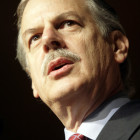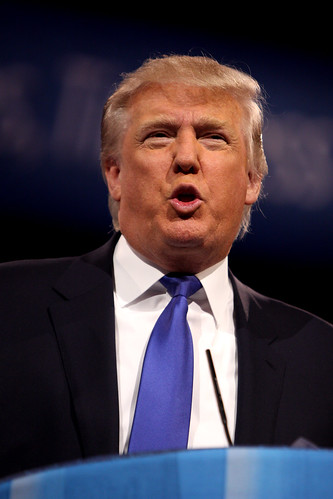From The Nation
Trump won because the status quo was terrible. We can't go back to it.Few entities have been more discombobulated by our madcap president than the bipartisan foreign policy establishment, which former Obama foreign-policy adviser Ben Rhodes once dubbed "the blob."
Donald Trump assaulted the blob with his "America First" posture and his explicit indictment of the "corrupt establishment." In the campaign, he scorned NATO as "obsolete," praised Putin, indicted the waste of $6 trillion in the Middle East, and denounced our failed trade deals.
As president, he's continued the assault. He has indicated no preference for a two-state or one-state "solution" for Israel and the Palestinians. He undermined our "One China policy" before re-affirming it. He pulled the plug on the Trans-Pacific Partnership deal. He alienated allies across the Middle East with his two Muslim bans. His secretary of state, Rex Tillerson, is literally home alone at the State Department, as top posts remain unfilled across the national-security bureaucracy.
And it hasn't even been two months. From the upholstered libraries and plush dining rooms of the foreign-policy establishment, Trump's antics elicit gasps of alarm, murmurs of disbelief, complaints of indigestion and dyspepsia.
The blob struck back last month. The Brookings Institution released a report called "Building Situations of Strength: A National Security Strategy for the United States," written by a bipartisan committee of the impeccably credentialed -- eight men, two women, all white. They include George Bush's former security adviser, Stephen Hadley; neoconservative guru Robert Kagan; Jake Sullivan, Hillary Clinton's deputy chief of staff; and counter-insurgency enthusiast Michele Flournoy. The report offers a concise summary of the conventional wisdom of the beleaguered foreign policy elites -- and it doesn't appear they learned anything.
The national-security managers dismiss the possibility of a more restrained posture. Should the United States choose to deemphasize Europe or the Middle East in order to focus on the Pacific, as Obama suggested? No, the report tells us, the regions are inextricably linked. We have no choice but to police them all.
Should the United States "distinguish between core and peripheral interests as other nations do?" No; while the United States "does not have to commit to responding to every act of aggression" across the world, "our historical experience suggests that some ambiguity that preserves the right to respond is necessary to bolster the international order." From tribal villages in Yemen to islets in the South China Sea, nothing is beneath our concern.
Should the United States distinguish between those threats that "pose a systemic risk to the international order and those that do not?" No, we shouldn't see a "monster under every bed," but we must be prepared to "take appropriate action" even where others might see a mere 'peripheral' interest," they write. And so our military maintains nearly 800 bases in 70 countries and dispatched Special Operations forces to 138 countries in 2016.
(Note: You can view every article as one long page if you sign up as an Advocate Member, or higher).






